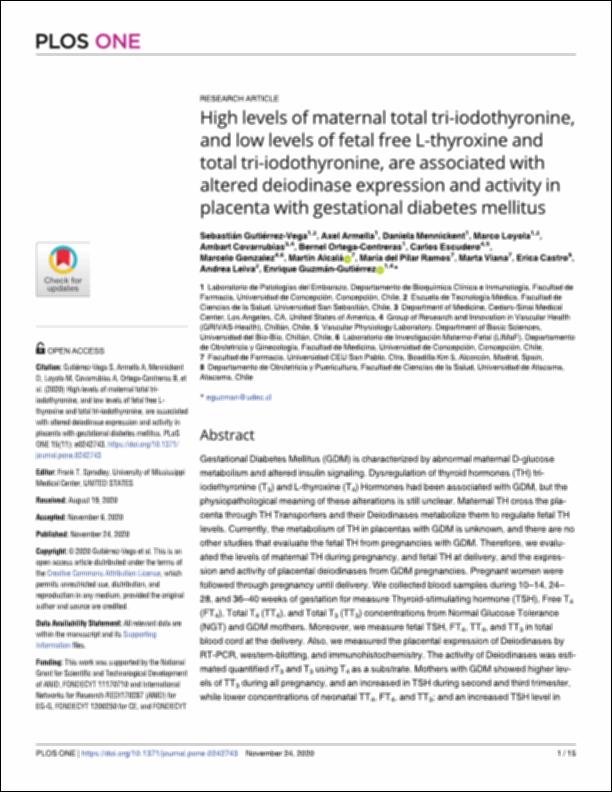Por favor, use este identificador para citar o enlazar este ítem:
http://hdl.handle.net/10637/14499High levels of maternal total tri-iodothyronine, and low levels of fetal free L-thyroxine and total tri-iodothyronine, are associated with altered deiodinase expression and activity in placenta with gestational diabetes mellitus
| Título : | High levels of maternal total tri-iodothyronine, and low levels of fetal free L-thyroxine and total tri-iodothyronine, are associated with altered deiodinase expression and activity in placenta with gestational diabetes mellitus |
| Autor : | Gutiérrez Vega, Sebastián Andrés Armella, Axel Mennickent, Daniela Loyola, Marco Covarrubias, Ambart Ortega-Contreras, Bermel Escudero, Carlos González, Marcelo Alcalá Díaz-Mor, Martín Viana Arribas, Marta Castro, Erica Leiva, Andrea Guzmán-Gutiérrez, Enrique Ramos Álvarez, María del Pilar |
| Materias: | Gestational Diabetes Mellitus (GDM); Glucose; Insulin |
| Editorial : | PLoS ONE |
| Citación : | Gutiérrez-Vega S, Armella A, Mennickent D, Loyola M, Covarrubias A, Ortega-Contreras B, et al. (2020) High levels of maternal total triiodothyronine, and low levels of fetal free Lthyroxine and total tri-iodothyronine, are associated with altered deiodinase expression and activity in placenta with gestational diabetes mellitus. PLoS ONE 15(11): e0242743. https://doi.org/10.1371/ journal.pone.0242743 |
| Resumen : | Gestational Diabetes Mellitus (GDM) is characterized by abnormal maternal D-glucose metabolism and altered insulin signaling. Dysregulation of thyroid hormones (TH) triiodethyronine (T3) and L-thyroxine (T4) Hormones had been associated with GDM, but the physiopathological meaning of these alterations is still unclear. Maternal TH cross the placenta through TH Transporters and their Deiodinases metabolize them to regulate fetal TH levels. Currently, the metabolism of TH in placentas with GDM is unknown, and there are no other studies that evaluate the fetal TH from pregnancies with GDM. Therefore, we evaluated the levels of maternal TH during pregnancy, and fetal TH at delivery, and the expression and activity of placental deiodinases from GDM pregnancies. Pregnant women were followed through pregnancy until delivery. We collected blood samples during 10–14, 24–28, and 36–40 weeks of gestation for measure Thyroid-stimulating hormone (TSH), Free T4 (FT4), Total T4 (TT4), and Total T3 (TT3) concentrations from Normal Glucose Tolerance (NGT) and GDM mothers. Moreover, we measure fetal TSH, FT4, TT4, and TT3 in total blood cord at the delivery. Also, we measured the placental expression of Deiodinases by RT-PCR, western-blotting, and immunohistochemistry. The activity of Deiodinases was estimated quantified rT3 and T3 using T4 as a substrate. Mothers with GDM showed higher levels of TT3 during all pregnancy, and an increased in TSH during second and third trimester, while lower concentrations of neonatal TT4, FT4, and TT3; and an increased TSH level in umbilical cord blood from GDM. Placentae from GDM mothers have a higher expression and activity of Deiodinase 3, but lower Deiodinase 2, than NGT mothers. In conclusion, GDM favors high levels of TT3 during all gestation in the mother, low levels in TT4, FT4 and TT3 at the delivery in neonates, and increases deiodinase 3, but reduce deiodinase 2 expression and activity in the placenta. |
| URI : | http://hdl.handle.net/10637/14499 |
| Derechos: | http://creativecommons.org/licenses/by-nc-nd/4.0/deed.es openAccess |
| ISSN : | 1932-6203X |
| Fecha de publicación : | 24-nov-2020 |
| Centro : | Universidad San Pablo-CEU |
| Aparece en las colecciones: | Facultad de Farmacia |
Los ítems de DSpace están protegidos por copyright, con todos los derechos reservados, a menos que se indique lo contrario.


